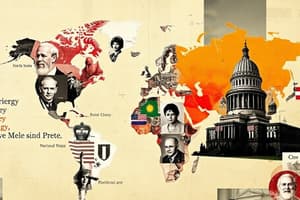Podcast
Questions and Answers
Match the following terms with their definitions:
Match the following terms with their definitions:
Nation = A group of people who share culture, language, and history State = A political entity with defined borders and its own government NGOs = Non-governmental organizations not tied to any country WTO = An organization made up of 162 countries around the world aimed at increasing free trade
Match the following international agreements with their descriptions:
Match the following international agreements with their descriptions:
NAFTA = An economic treaty between US, Canada, and Mexico allowing for tax-free trade Trade Agreement = When two or more nations agree on terms of trade including tariffs and duties Unilateral = Actions or decisions taken by only one party without involvement of others Multilateral = Situations or agreements involving multiple parties or participants
Match the following concepts with their definitions:
Match the following concepts with their definitions:
Global Interstate System = A system of competing and allying states on a global scale Sense of Belonging Together = The feeling of connection and unity within a group sharing culture and history Competing States = Political entities vying for power and influence in the international arena Free Trade = The practice of trading goods without restrictions like tariffs or quotas
Match the following terms with their characteristics:
Match the following terms with their characteristics:
Match the following concepts with their examples:
Match the following concepts with their examples:
Match the following terms with their definitions:
Match the following terms with their definitions:
Match the following terms with their characteristics:
Match the following terms with their characteristics:
Match the following concepts with their implications:
Match the following concepts with their implications:
Match the following terms with their roles:
Match the following terms with their roles:
Match the following terms with their categorizations:
Match the following terms with their categorizations:
Flashcards are hidden until you start studying
Study Notes
Study Notes
Terms and Definitions
- Terms and definitions are matched to identify the correct explanation for each term.
- International agreements are paired with their descriptions to understand their purpose and scope.
- Concepts are linked with their definitions to clarify their meaning and application.
- Terms are categorized by their characteristics to recognize their distinct features.
- Concepts are illustrated with examples to demonstrate their practical implications.
- Terms are defined and explained to provide a clear understanding of their meaning.
- Concepts are examined for their characteristics to identify their key attributes.
- Concepts are analyzed for their implications to understand their potential consequences.
- Terms are identified by their roles to recognize their functions and responsibilities.
- Terms are grouped by their categorizations to recognize their classification and relationships.
Studying That Suits You
Use AI to generate personalized quizzes and flashcards to suit your learning preferences.




